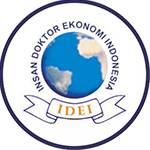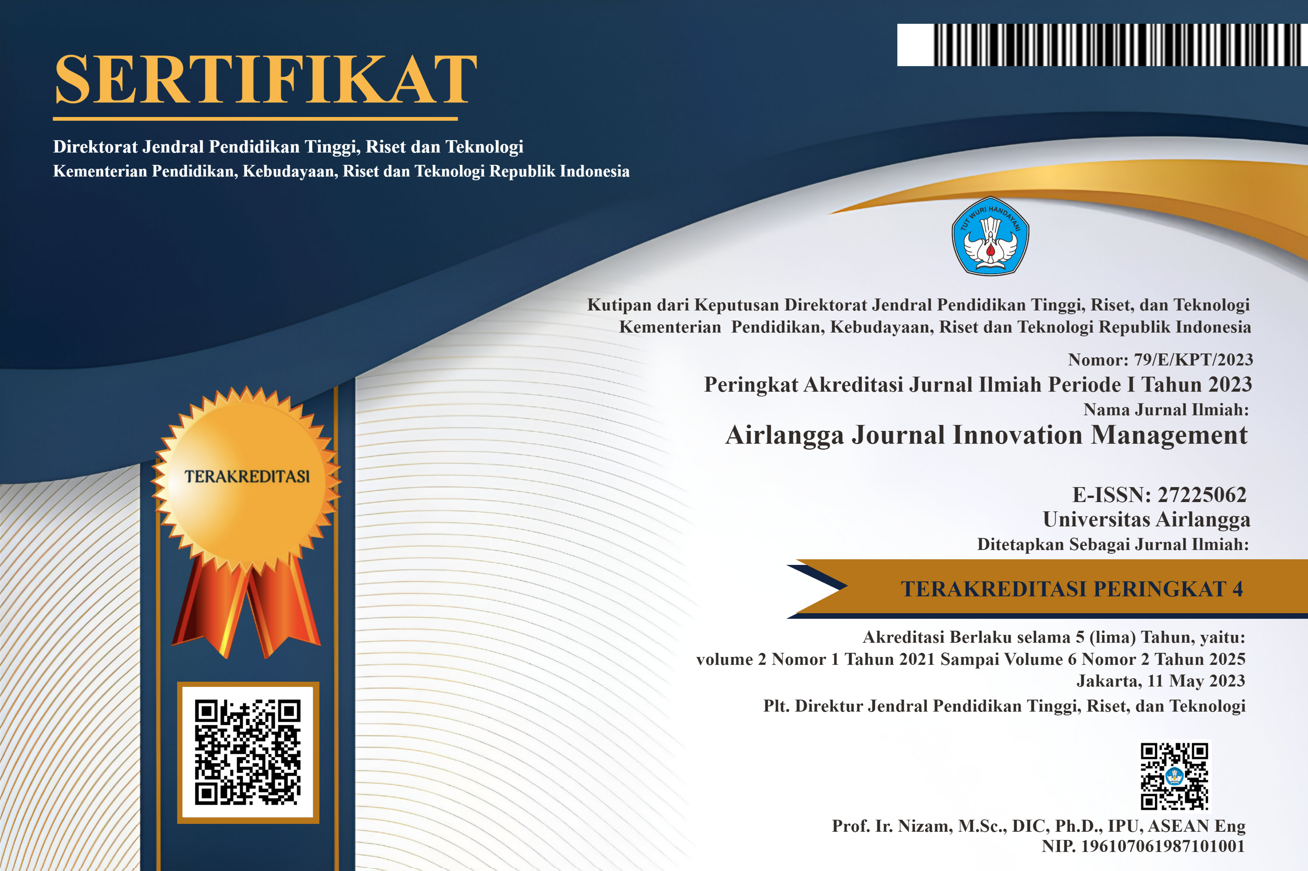Factors Influencing Economic Growth in OIC Countries: A Panel Data Approach
Downloads
Economic growth plays a crucial role in determining the success of a country's development, with each nation setting stable economic growth targets within its development agenda. The process of economic growth is influenced by various factors that can either drive or hinder the pace of growth. This study aims to analyze the impact of zakah growth, the scientific and technical journal articles, population, and unemployment rates on the economic growth of 10 member countries of the Organization of Islamic Cooperation (OIC) for the period 2002-2022 using a quantitative approach with a random effects panel data regression analysis technique and EViews 12 application for data management. As per the research findings, the variables of zakah and scientific and technical journal articles have a positive and significant relationship with economic growth. The population and unemployment rate have a negative and significant. Therefore, it is recommended that governments should improve efficiency in the management of zakah, allocate more budget for education and research, and formulate policies to promote innovation and collaboration between related sectors. It assists in achieving more awareness of zakah and participation in monitoring the utilization of zakah funds for society. The studies would help to see what variables affect economic growth.
Abdulkadir, A., Afriana, W., & Azis, H. (2020). THE EFFECTS OF R&D EXPENDITURES ON ECONOMIC GROWTH IN OECD COUNTRIES. Airlangga Journal of Innovation Management, 1(2), 175. https://doi.org/10.20473/ajim.v1i2.21607
Afandi, A. (2022). Fund Management through Zakah Institutions: An Education Financing Solution. Eurasian Journal of Educational Research, 2022(100), 119–132. Scopus. https://doi.org/10.14689/ejer.2022.100.009
Agezew, B. H. (2024). The Effect of Research and Development on Economic Growth in Ethiopia: The Untapped Potential for Prosperity. Education Research International, 2024, 1–7. https://doi.org/10.1155/2024/5562940
Aghaei, M., & Rezagholizadeh, M. (2017). The impact of information and communication technology (ICT) on economic growth in the OIC Countries. Economic and Environmental Studies, 17(2 (42)), 257–278.
Akorede, O. (2015). Effect of Unemployment and Growth on Nigeria Economic Development. Developing Country Studies, 5(17), 38–41.
Aliedan, M. M., Alyahya, M. A., Elshaer, I. A., & Sobaih, A. E. E. (2023). Who Is Going Green? Determinants of Green Investment Intention in the Saudi Food Industry. Agriculture, 13(5), Article 5. https://doi.org/10.3390/agriculture13051047
Amijaya, R. N. F., Andika Eko Prassetyo, Rensia Yuliati Pratama, & Intan Wardah Kharisma. (2023). Does Islamic Finance Matter for Poverty Development in Indonesia? Airlangga Journal of Innovation Management, 4(2), 185–197. https://doi.org/10.20473/ajim.v4i2.49756
Amirat, A., & Zaidi, M. (2020). Estimating GDP Growth in Saudi Arabia Under the Government's Vision 2030: A Knowledge-based Economy Approach. Journal of the Knowledge Economy, 11(3), 1145–1170. https://doi.org/10.1007/s13132-019-00596-2
Anghel, M.-G., Anghelache, C., & Manole, A. (2017). The effect of unemployment on economic growth. Romanian Statistical Review Supplement, 65(7), 174–186.
Anser, M. K., Ahmad, M., Khan, M. A., Nassani, A. A., Haffar, M., & Zaman, K. (2023). The "IMPACT” of Web of Science Coverage and Scientific and Technical Journal Articles on the World's Income: Scientific Informatics and the Knowledge-Driven Economy. Journal of the Knowledge Economy. https://doi.org/10.1007/s13132-023-01302-z
Anwar, M. (2024). The Impact of Islamic Financial Deepening on Economic Growth in Indonesia. Airlangga Journal of Innovation Management, 5(1), 78–90. https://doi.org/10.20473/ajim.v5i1.51402
Appelbaum, M., Cooper, H., Kline, R. B., Mayo-Wilson, E., Nezu, A. M., & Rao, S. M. (2018). Journal article reporting standards for quantitative research in psychology: The APA Publications and Communications Board task force report. American Psychologist, 73(1), 3.
Ashfahany, A. E., Hidayah, walul D. N., Hakim, L., & Noh, M. S. B. M. (2023). How Zakat Affects Economic Growth In Three Islamic Countries. Journal of Islamic Economic Laws, 6(1), 45–61. https://doi.org/10.23917/jisel.v6i1.21242
Ben Jedidia, K., & Guerbouj, K. (2020). Effects of zakat on the economic growth in selected Islamic countries: Empirical evidence. International Journal of Development Issues, 20(1), 126–142. https://doi.org/10.1108/IJDI-05-2020-0100
Bouanani, M., & Belhadj, B. (2019). Zakat and poverty alleviation in Tunisia using the fuzzy approach. Journal of Quantitative Economics, 17, 421–432.
Caraka, R. E., & Yasin, H. (2017). Spatial Data Panel.
Ciriello, R. F., Richter, A., & Mathiassen, L. (2024). Emergence of creativity in IS development teams: A socio-technical systems perspective. International Journal of Information Management, 74, 102698. https://doi.org/10.1016/j.ijinfomgt.2023.102698
Costantini, L., Laio, F., Ridolfi, L., & Sciarra, C. (2023). An R&D perspective on international trade and sustainable development. Scientific Reports, 13. https://doi.org/10.1038/s41598-023-34982-3
Davis, K. (2015). The urbanization of the human population. In The city reader (pp. 43–53). Routledge.
Dohoo, I. R., Ducrot, C., Fourichon, C., Donald, A., & Hurnik, D. (1997). An overview of techniques for dealing with large numbers of independent variables in epidemiologic studies. Preventive Veterinary Medicine, 29(3), 221–239.
Elorhor, O. T. (2019). Unemployment and its Effect on the Growth of Nigeria Economy. 1–9. https://doi.org/10.9734/JEMT/2019/V23I230129
Furuoka, F. (2018). Is population beneficial to economic growth? An empirical study of China. Quality & Quantity, 52(1), 209–225. https://doi.org/10.1007/s11135-016-0463-6
Gujarati, D. N. (2021). Essentials of econometrics. Sage Publications.
Hodijah, S., & Angelina, G. P. (2021). Analisis pengaruh ekspor dan impor terhadap pertumbuhan ekonomi di Indonesia. Jurnal Manajemen Terapan Dan Keuangan, 10(01), 53–62.
Hossain, B. (2019). Islamic Microfinance and Rehabilitation Program for the Slum and Floating Population by the Waqf Funds: A Proposal Based on Empirical Evidences for the Muslim Countries. In Revitalization of Waqf for Socio-Economic Development, Volume I (Vol. 1, pp. 267–284). Springer International Publishing; Scopus. https://doi.org/10.1007/978-3-030-18445-2_13
Hsiao, F., & Gibson, E. (2003). Processing relative clauses in Chinese. Cognition, 90(1), 3–27.
Huda, N. (2015). Zakat Perspektif Mikro-Makro: Pendekatan Riset. Prenada Media.
Huda, N. (2017). Ekonomi pembangunan islam. Prenada Media.
Islam, R., Omar, M., & Rahman, M. (2023). Islamic Social Funds to Foster Yunusian Social Business and Conventional Social Enterprises. Administrative Sciences, 13(4), 102. https://doi.org/10.3390/admsci13040102
Jan, S., & Khan, Z. (2018). Institutionalising justice in Islamic finance. Journal of Islamic Economics, Banking and Finance, 14(1), 205–216. Scopus. https://doi.org/10.12816/0051175
Jedidia, K. B., & Guerbouj, K. (2020). Effects of zakat on the economic growth in selected Islamic countries: Empirical evidence. International Journal of Development Issues, 20(1), 126–142.
Kasri, R. A., & Chaerunnisa, S. R. (2022). The role of knowledge, trust, and religiosity in explaining the online cash waqf amongst Muslim millennials. Journal of Islamic Marketing, 13(6), 1334–1350. https://doi.org/10.1108/JIMA-04-2020-0101
Khan, S., Abdul Hamid, B., & Rehman, M. Z. (2023). Determinants of shadow economy in OIC and non-OIC countries: The role of financial development. International Journal of Emerging Markets, 18(10), 3373–3393.
Lestari, N. P., & Auwalin, I. (2022). Zakat dan Ketimpangan Pendapatan di Indonesia: Analisis Data Panel di 34 Provinsi. Jurnal Ekonomi Syariah Teori Dan Terapan, 9(6).
Lestari, N. P., Syaifullah, Affan, I., & Herianingrum, S. (2024). The Nexus Between Zakat, Population, Scientific and Technical Journal Articles, and Economic Growth: Panel Data Analysis in Muslim-Majority Countries. Jurnal Ekonomi Syariah Teori Dan Terapan, 11(1), Article 1. https://doi.org/10.20473/vol11iss20241pp77-85
Lini, Z. Z., & Sasana, H. (2019). Pengaruh tingkat globalisasi terhadap pengangguran Di ASEAN. Jurnal REP (Riset Ekonomi Pembangunan), 4(1), 13–26.
Maestas, N., Mullen, K. J., & Powell, D. (2023). The Effect of Population Aging on Economic Growth, the Labor Force, and Productivity. American Economic Journal: Macroeconomics, 15(2), 306–332. https://doi.org/10.1257/mac.20190196
Mankiw, N. G., Taylor, M. P., Ashwin, A., & Platt, S. J. (2016). Business economics. Cengage Learning Hampshire.
Mawardi, I., Al Mustofa, M. U., Widiastuti, T., & Ghozali, M. (2024). The Influence of Institutional Quality, Economic Freedom, and Technological Development on Islamic Financial Development in OIC Countries. Journal of Open Innovation: Technology, Market, and Complexity, 100279.
Muliadi, S. (2020). The Role of Zakat on Sustainable Economic Development by Rumah Zakat. 355–370. https://doi.org/10.37706/ICONZ.2020.208
Muttaqin, R. (2018). Pertumbuhan Ekonomi dalam Perspektif Islam Economic Growth in Islamic Perspective. 2.
Nuryitmawan, T. R. (2023). The Impact of Islamic Fintech on Poverty Alleviation in Indonesia: A Socio-Economic Implications. Airlangga Journal of Innovation Management, 4(2), 136–146. https://doi.org/10.20473/ajim.v4i2.49478
Rapanna, P., & Sukarno, Z. (2017). Development Economics. Makassar: Sah Media.
Resosudarmo, B. P., Latiph, A., Sarntisart, S., & Sarntisart, I. (2016). Development in Southeast Asia's lagging regions. Managing Globalization in the Asian Century: Essays in Honour of Prema-Chandra Athukorala, 132–162.
Ryandono, M. N. H. (2008). Ekonomi ZISWAQ (Zakat, Infaq, Shadaqah dan Waqaf). Surabaya: IFDI Dan Cenforis.
Serifat, O. A. (2020). Effects of Youth Unemployment and its Consequences on Economic Growth in Nigeria. 5(3), 33–40.
Setiyowati, A. (2019). EMPOWERING ISLAMIC PHILANTHROPY: ANALYSIS OF ENTREPRENEURIAL CAPITAL ASSISTANCE PROGRAM BY LAZISMU SURABAYA CITY. Humanities & Social Sciences Reviews, 7(4), 1018–1025. https://doi.org/10.18510/hssr.2019.74139
Shaukat, B., & Zhu, Q. (2021). Finance and growth: Particular role of Zakat to levitate development in transition economies. International Journal of Finance & Economics, 26(1), 998–1017.
Sinha, J. K. (2022). Impact of unemployment and inflation on the economic growth of india. JOURNAL OF DEVELOPMENT ECONOMICS AND FINANCE, 3(2), 397–417. https://doi.org/10.47509/jdef.2022.v03i02.09
Srihardianti, M., Mustafid, M., & Prahutama, A. (2016). Metode regresi data panel untuk peramalan konsumsi energi di indonesia. Jurnal Gaussian, 5(3), 475–485.
Suprayitno, E. (2020). The impact of zakat on economic growth in 5 state in Indonesia. International Journal of Islamic Banking and Finance Research, 4(1), 1–7.
Syaifullah, S., Sari, N. S., & Hasniati, H. (2024). Capitalism in the UK: A perspective from marxist political economy Capitalism in the UK: a perspective from marxist political economy by Mike Campbell, Routledge, 2023, 206 Pages, USD 111,12(Hardback), ISBN: 9781032422121: by Mike Campbell, Routledge, 2023, 206 Pages, USD 111,12 (Hardback), ISBN: 9781032422121. Review of Political Economy, 1–4. https://doi.org/10.1080/09538259.2024.2312354
Theodoris, D., Setyari, N. P. W., & Aswitari, L. P. (2017). Pengaruh Indeks Kemudahan Berbisnis, Foreign Direct Investment dan Populasi Penduduk terhadap Perekonomian ASEAN. E-Jurnal Ekonomi Pembangunan Universitas Udayana, 6(12), 2322–2351.
Tuna, K., Kayacan, E., & Bektaş, H. (2015). The Relationship Between Research & Development Expenditures and Economic Growth: The Case of Turkey. Procedia - Social and Behavioral Sciences, 195, 501–507. https://doi.org/10.1016/j.sbspro.2015.06.255
Wardani, I. I., & Arif, M. N. R. (2021). The Effect of Sharia Bank Financing, Zakat, and Education Expense, on Economic Growth and Human Development Index in Indonesia 2015-2019. 5(1), 1–10. https://doi.org/10.30983/ES.V5I1.4096
Widiastuti, T., Mawardi, I., Zulaikha, S., Herianingrum, S., Robani, A., Al Mustofa, M. U., & Atiya, N. (2022). The nexus between Islamic social finance, quality of human resource, governance, and poverty. Heliyon, 8(12).
Copyright (c) 2024 Airlangga Journal of Innovation Management

This work is licensed under a Creative Commons Attribution-NonCommercial-ShareAlike 4.0 International License.
- The journal allows authors to hold copyright without restrictions and retain publication rights without restrictions. The author retains the copyright and grants the first publication rights to the journal, with his work simultaneously licensed under the Creative Commons Attribution-NonCommercial-ShareAlike 4.0 International License (CC BY-NC-SA). This license allows others to share the work with acknowledgment of authorship and initial publication in this journal, provided that the work is not used for commercial purposes and that any derivative works must use the same license.
- Authors may enter into additional contractual agreements for non-exclusive distribution of the journal publication version (e.g., uploading it to an institutional repository or publishing it in book form), while still including acknowledgment of the initial publication in this journal.
- Authors are allowed and encouraged to upload their work online (e.g., in an institutional repository or personal website) before and during the submission process. This can support productive scientific exchanges as well as increase citations to published works.

AJIM by UNAIR is licensed under a Creative Commons Attribution-NonCommercial-ShareAlike 4.0 International License.





















